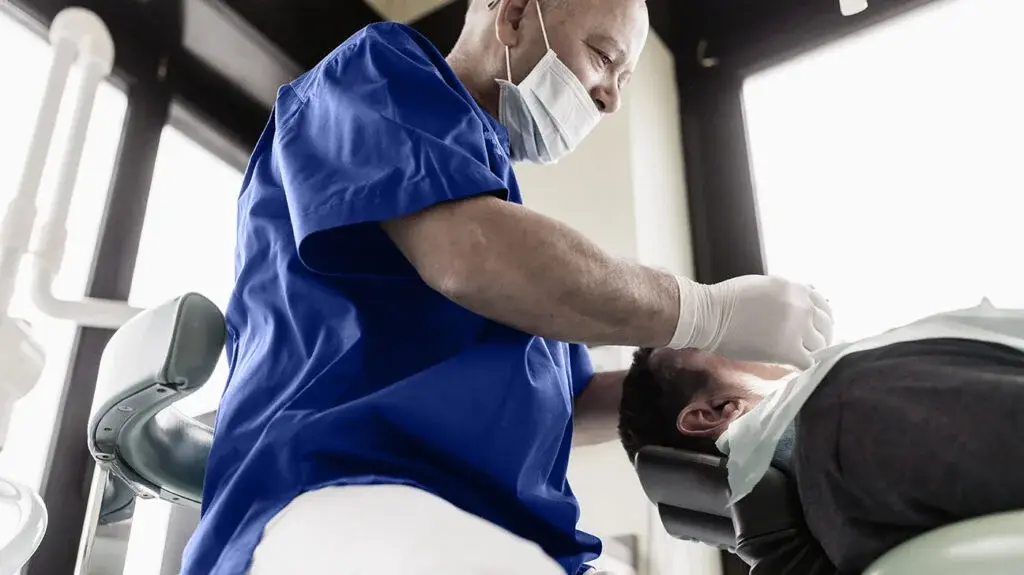Submit Request ...
-
Forums
Effects of multiple sclerosis on teeth

Dentists may need to remove teeth due to decay, injury, periodontal disease, or other reasons. Although extractions are a common procedure, they can pose unique challenges for people with MS. Working with a dentist to minimize discomfort and ensure safety is essential.
This article looks at MS and dental extractions, including why they might be necessary, what the procedure involves, the recovery process, and dental reconstruction options for people with MS.
How does MS affect the teeth?

MS is a neurological condition that affects the nerves of the brain and spinal cord. Inflammation of these nerves interferes with their ability to send electrical signals, which can result in a range of symptoms, such as numbness, tingling, difficulty walking, and weakness.
People living with MS have an increased risk of dental disease. They may have difficulty caring for their teeth consistently due to:
1. fatigue
2. tremors
3. a weakened handgrip
4. difficulties with coordination
5. mood changes, including depression
6. trigeminal neuralgia, which may make brushing the teeth extremely painful
Additionally, some of the side effects of MS medications can cause a reduction of saliva in the mouth. This increases the risk of tooth decay and gum disease.
When are tooth extractions necessary?
Tooth extractions are usually only necessary if a tooth becomes damaged beyond repair or if it poses a risk to the rest of the teeth. A person may require a tooth extraction for the following reasons:
Impaction: If the growth of one tooth pushes against another, this can cause impaction. For example, if a wisdom tooth grows at an angle, it can become impacted against existing teeth.
Tooth decay: The build up of tartar and plaque can eat away at the tooth enamel, making it weak, brittle, and prone to infection.
Periodontal and gum disease: These conditions cause inflammation of the gums that can progress to the bone and tissue surrounding the teeth.
Trauma: Sports, accidents, and falls can damage the teeth. Any wounds to the gums or teeth may become infected.
Overcrowding: If there is not enough room in the mouth for all the teeth, they can become overcrowded, crooked, and impacted.
Tooth extractions in people with MS
Tooth extractions involve a similar procedure for people with MS as for others.
Dentists may need to make certain adjustments for people with MS, including:
Reviewing medications: Steroid medications can raise the risk of infection. Therefore, a doctor may recommend that the person adjusts their steroid dosage or uses antibiotics as a preventive measure for an upcoming dental extraction. The doctor should pay special attention to the antibiotics they choose, as some interact with MS medications.
Mouth moisturizers: Using a mouth rinse or gel to stimulate saliva can help lessen the effects of dry mouth, making recovery swifter and more comfortable. This may also reduce the chance of an infection developing. A few drops of lemon juice may also help stimulate saliva production.
Shorter treatments: People with MS may have difficulty attending long dental appointments, and sitting in a dentist’s chair can lead to pulmonary aspiration in some individuals. This is when a person inhales liquid or saliva into the lungs. The dentist may find ways to complete the treatment as quickly as possible or suggest the individual lies down horizontally, facing upward.
Dental equipment: Dentists should consider using mouth openers, tongue depressors, finger protectors, and retractors to prevent unwanted mouth movements or biting of the dentist’s fingers.
Recovery from dental extractions
Recovering from a dental extraction involves allowing a blood clot to form in the space where the tooth was. This means avoiding disturbing the area so as not to dislodge the clot.
Here are some other tips for recovery:
Rest: Try to take it easy and avoid strenuous activities for at least the first 24 hours after the extraction.
Change the gauze: The gauze should stay in position for several hours to allow the clot to form. After this, the individual can change it as often as necessary.
Avoid rinsing and spitting: Rinsing, spitting, and using a straw for drinks can dislodge clots and impact healing time.
Avoid blowing the nose or sneezing: The pressure from sneezing or blowing the nose can dislodge a developing blood clot.
Do not smoke: Smoking slows healing and can affect blood clot formation. It can also worsen mouth dryness.
Use cold compresses: Using an ice pack wrapped in a towel on the affected area may help ease the pain.
It is normal to expect some low level bleeding for up to 24 hoursTrusted Source following an extraction. However, if bleeding continues after this point, consult the dentist.
Because people with MS may take various medications, they should consult their doctor about suitable options to relieve pain and inflammation. If they began antibiotics before the extraction, they should continue taking the full course unless the doctor says otherwise.
Sometimes, taking antibiotics can allow oral thrush to develop in people with MS. They may notice white patches in their mouth or a burning sensation. The dentist or doctor can prescribe antifungal medications to treat the condition.
Dental restoration for people with MS
The loss of teeth can significantly impact a person’s quality of life. It may lead to problems with eating, speaking, and self-esteem.
Dental restoration can reconstruct missing teeth. There are several ways of replacing them, including:
Dental implants: In this procedure, a dentist places a titanium post into the jawbone, which fuses with the bone. Next, they attach a false tooth to the post.
Bridge: This is a replacement tooth that uses adjacent teeth for support.
Partial denture: This is a removable appliance that dentists may use when there are multiple missing teeth.
Complete denture: This removable appliance replaces all of the teeth.
Dentures can be problematic for people with MS, who may have difficulty with them due to mouth dryness or find them hard to remove and insert.
If an individual has swallowing difficulties, dentures could exacerbate this, leading to choking or problems eating. Therefore, dentists will assess each person individually before making their recommendations.
Can dental work cause or worsen MS?
There is no scientific evidence that dental work itself can cause or worsen MS. However, people with the condition may find it exhausting to attend long dental appointments. In this sense, having dental work could increase fatigue and worsen MS symptoms, as any other activity a person finds tiring might do.
Some people may have concerns that the mercury in amalgam fillings might cause MS or make symptoms worse. There is a lack of research to prove this. If people have concerns about getting fillings, they can contact a dentist.
Please let us know what you think!